
Relapse can feel devastating. After working so hard to achieve sobriety or stability, slipping backward may seem like losing everything you fought for. Guilt, shame, and fear often rush in quickly.
But here’s the truth many people don’t hear enough: relapse is a part of recovery for many individuals, not the end of it. What matters most is not the relapse itself, but what you do next.
This article will explore how to reframe relapse as an opportunity for growth, the steps to take immediately after a setback, and how to rebuild a recovery path stronger than before.
Understanding Relapse: It’s Not a Moral Failure
Relapse is not a sign that you are weak, unmotivated, or doomed to fail. It is a symptom that some underlying needs have not been fully addressed.
Factors that often contribute to relapse include:
- Unresolved trauma or emotional pain
- High levels of stress without healthy outlets
- Poor coping strategies for cravings or triggers
- Lack of a strong support network
- Overconfidence, leading to risky situations or complacency
Relapse often exposes vulnerabilities that were hidden during the early stages of recovery. Instead of viewing relapse as a defeat, it can be seen as valuable feedback — information that points the way toward deeper healing.

First Steps After a Relapse
1. Reach Out Immediately
Isolation fuels shame and worsens the spiral. Contact a counselor, sponsor, sober friend, or recovery group right away. You are not alone — and you don’t have to face this setback alone.
2. Stop the Spiral Early
One use does not have to turn into a full return to old patterns. Catching relapse early, even after one incident, can prevent further harm and help you regain your footing faster.
3. Practice Radical Self-Compassion
Relapse is painful enough without layering on self-hatred. Acknowledge your humanity. Recovery is a learning process, not a pass-fail test.
4. Assess the Situation Honestly
With support, explore what led to the relapse. What emotions, events, or environments contributed? What can you learn from this experience?
Rebuilding After Relapse
Recovery after relapse requires honesty, adjustment, and renewed commitment.
Key strategies include:
- Update Your Recovery Plan: New triggers or weaknesses may require new coping strategies or supports.
- Increase Accountability: More frequent meetings with a sponsor, counselor, or group can help.
- Strengthen Your Support Network: Consider joining a new group, reconnecting with supportive people, or expanding your sources of encouragement.
- Develop Relapse Prevention Skills: Learn warning signs earlier and plan specific actions to take when cravings arise.
- Forgive Yourself and Move Forward: You are not defined by your relapse. You are defined by your decision to continue fighting for your life.

A New Chapter, Not the End
Every relapse holds an opportunity: to understand yourself better, to rebuild your recovery plan more effectively, and to reconnect with the reasons you chose healing in the first place.
You have not lost everything.
You have gained experience, insight, and — if you let it — a renewed sense of purpose.
Recovery is not about never falling. It is about always getting back up.
Contact Us
Om to Home – Inpatient Detox & Substance Abuse Treatment
1120 S Park Avenue
Apopka, FL 32703
(321) 251-2240
Confidential. Compassionate. Here for you 24/7.

